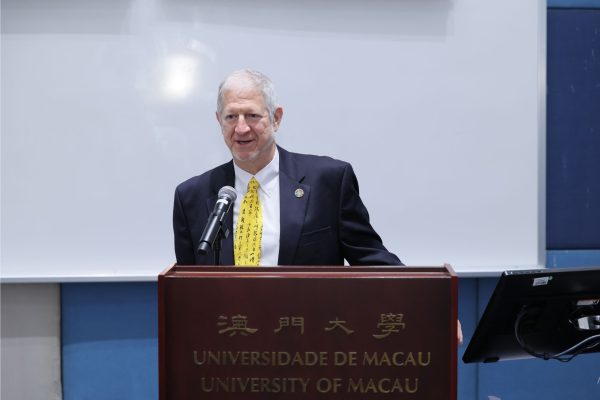News Express: KAUST professor gives talk on quantum computing at UM
新聞快訊:阿卜杜拉國王科技大學教授於澳大談量子計算

David Keyes
阿卜杜拉國王科技大學教授於澳大談量子計算
澳門大學今(6)日舉行“大學講壇”,邀請沙特阿拉伯阿卜杜拉國王科技大學應用數學與計算機科學教授David Keyes以“量子計算的嘗試與展望”為題發表演說,吸引一眾澳大師生及研究人員參與。
澳大科技學院院長須成忠表示,David Keyes是高性能運算領域權威學者,被評為HPCwire 2024年度“35位高性能運算領袖人物”(35 HPC Legends: Class of 2024)之一。他是阿卜杜拉國王科技大學數學與計算機科學與工程系創始院長及極限運算研究中心主任;曾領導美國能源部多項關鍵研究計劃,其研究成果廣泛應用於氣候模擬、能源系統、航空工程等領域,對全球高效能運算發展作出重要貢獻。
講座上,David Keyes提出“量子優先”策略,預測未來超級電腦將結合量子處理單元與傳統的圖形處理單元及中央處理單元,形成混合架構,以提升能源效率與科學運算效益。他指出,量子運算的早期優勢將可能透過與傳統超級電腦結合的量子處理單元實現,該配置有助最大化每焦耳能量所產出的科學成果。他表示,儘管量子技術仍面臨硬體穩定性、成本、記憶體限制、程式設計生態尚未成熟等挑戰,但其發展可借鑒並結合傳統運算的成功經驗。對此,David Keyes呼籲學術界積極推動跨領域合作,培育相關人才,迎接量子與傳統運算共存的新時代。
問答及交流環節由澳大科技學院副院長蔡小川主持,David Keyes與參與者交流互動,討論氣氛熱烈。
欲瀏覽官網版可登入以下連結:
https://www.um.edu.mo/zh-hant/news-and-press-releases/press-release/detail/62488/
KAUST professor gives talk on quantum computing at UM
The University of Macau (UM) held a talk titled ‘The Earliest Arrival of Quantum Advantage’ today (6 November) as part of its University Lecture Series, featuring David Keyes, professor of applied mathematics and computational science at King Abdullah University of Science and Technology (KAUST). The talk was well attended by UM faculty, students, and researchers.
Speaking at the event, Xu Cheng-Zhong, dean of the UM Faculty of Science and Technology, said that Prof Keyes is a leading figure in the field of high-performance computing and has been named one of ‘HPCwire 35 Legends: Class of 2024’. He is the founding dean of the Mathematical and Computer Sciences and Engineering Division and director of the Extreme Computing Research Center at KAUST. He previously led several key research projects for the US Department of Energy and his research findings have been widely applied in areas such as climate modelling, energy systems, and aerospace engineering, making significant contributions to the global development of high-performance computing.
During the talk, Prof Keyes introduced the concept of a ‘quantum first’ strategy, whereby future supercomputers will integrate quantum processing units (QPUs) with classical computing components, such as graphics processing units (GPUs) and central processing units (CPUs), to form a hybrid architecture. He mentioned that this hybrid architecture can enhance energy efficiency and computational suitability, ultimately maximising scientific output per unit of energy. Prof Keyes also discussed the current challenges facing quantum computing, including hardware reliability, cost, limited memory, and an immature programming ecosystem, adding that quantum computing will evolve by learning from classical computing systems. To this end, he encouraged the academic community to actively promote interdisciplinary collaboration and talent development in order to prepare for a future where quantum and classical computing coexist.
In addition, Prof Keyes engaged with the audience during the Q&A and discussion session, which is moderated by Cai Xiaochuan, associate dean of the UM Faculty of Science and Technology.
To read the news on UM’s official website, please visit the following link:
https://www.um.edu.mo/news-and-press-releases/press-release/detail/62488/